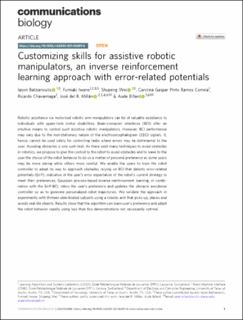Please use this identifier to cite or link to this item:
https://doi.org/10.21256/zhaw-23823Full metadata record
| DC Field | Value | Language |
|---|---|---|
| dc.contributor.author | Batzianoulis, Iason | - |
| dc.contributor.author | Iwane, Fumiaki | - |
| dc.contributor.author | Wei, Shupeng | - |
| dc.contributor.author | Correia, Carolina Gaspar Pinto Ramos | - |
| dc.contributor.author | Chavarriaga, Ricardo | - |
| dc.contributor.author | Millán, José del R. | - |
| dc.contributor.author | Billard, Aude | - |
| dc.date.accessioned | 2021-12-22T14:14:44Z | - |
| dc.date.available | 2021-12-22T14:14:44Z | - |
| dc.date.issued | 2021-12-16 | - |
| dc.identifier.issn | 2399-3642 | de_CH |
| dc.identifier.uri | https://digitalcollection.zhaw.ch/handle/11475/23823 | - |
| dc.description.abstract | Robotic assistance via motorized robotic arm manipulators can be of valuable assistance to individuals with upper-limb motor disabilities. Brain-computer interfaces (BCI) offer an intuitive means to control such assistive robotic manipulators. However, BCI performance may vary due to the non-stationary nature of the electroencephalogram (EEG) signals. It, hence, cannot be used safely for controlling tasks where errors may be detrimental to the user. Avoiding obstacles is one such task. As there exist many techniques to avoid obstacles in robotics, we propose to give the control to the robot to avoid obstacles and to leave to the user the choice of the robot behavior to do so a matter of personal preference as some users may be more daring while others more careful. We enable the users to train the robot controller to adapt its way to approach obstacles relying on BCI that detects error-related potentials (ErrP), indicative of the user’s error expectation of the robot’s current strategy to meet their preferences. Gaussian process-based inverse reinforcement learning, in combination with the ErrP-BCI, infers the user’s preference and updates the obstacle avoidance controller so as to generate personalized robot trajectories. We validate the approach in experiments with thirteen able-bodied subjects using a robotic arm that picks up, places and avoids real-life objects. Results show that the algorithm can learn user’s preference and adapt the robot behavior rapidly using less than five demonstrations not necessarily optimal. | de_CH |
| dc.language.iso | en | de_CH |
| dc.publisher | Nature Publishing Group | de_CH |
| dc.relation.ispartof | Communications Biology | de_CH |
| dc.rights | https://creativecommons.org/licenses/by/4.0/ | de_CH |
| dc.subject.ddc | 006: Spezielle Computerverfahren | de_CH |
| dc.subject.ddc | 621.3: Elektro-, Kommunikations-, Steuerungs- und Regelungstechnik | de_CH |
| dc.title | Customizing skills for assistive robotic manipulators, an inverse reinforcement learning approach with error-related potentials | de_CH |
| dc.type | Beitrag in wissenschaftlicher Zeitschrift | de_CH |
| dcterms.type | Text | de_CH |
| zhaw.departement | School of Engineering | de_CH |
| zhaw.organisationalunit | Centre for Artificial Intelligence (CAI) | de_CH |
| dc.identifier.doi | 10.1038/s42003-021-02891-8 | de_CH |
| dc.identifier.doi | 10.21256/zhaw-23823 | - |
| zhaw.funding.eu | No | de_CH |
| zhaw.issue | 1406 | de_CH |
| zhaw.originated.zhaw | Yes | de_CH |
| zhaw.publication.status | publishedVersion | de_CH |
| zhaw.volume | 4 | de_CH |
| zhaw.publication.review | Peer review (Publikation) | de_CH |
| zhaw.webfeed | Machine Perception and Cognition | de_CH |
| zhaw.webfeed | Datalab | de_CH |
| zhaw.author.additional | No | de_CH |
| zhaw.display.portrait | Yes | de_CH |
| Appears in collections: | Publikationen School of Engineering | |
Files in This Item:
| File | Description | Size | Format | |
|---|---|---|---|---|
| 2021_Batzianoulis-etal_Customizing-skills-assistive-robotic-manipulators.pdf | 2.37 MB | Adobe PDF |  View/Open |
Show simple item record
Batzianoulis, I., Iwane, F., Wei, S., Correia, C. G. P. R., Chavarriaga, R., Millán, J. d. R., & Billard, A. (2021). Customizing skills for assistive robotic manipulators, an inverse reinforcement learning approach with error-related potentials. Communications Biology, 4(1406). https://doi.org/10.1038/s42003-021-02891-8
Batzianoulis, I. et al. (2021) ‘Customizing skills for assistive robotic manipulators, an inverse reinforcement learning approach with error-related potentials’, Communications Biology, 4(1406). Available at: https://doi.org/10.1038/s42003-021-02891-8.
I. Batzianoulis et al., “Customizing skills for assistive robotic manipulators, an inverse reinforcement learning approach with error-related potentials,” Communications Biology, vol. 4, no. 1406, Dec. 2021, doi: 10.1038/s42003-021-02891-8.
BATZIANOULIS, Iason, Fumiaki IWANE, Shupeng WEI, Carolina Gaspar Pinto Ramos CORREIA, Ricardo CHAVARRIAGA, José del R. MILLÁN und Aude BILLARD, 2021. Customizing skills for assistive robotic manipulators, an inverse reinforcement learning approach with error-related potentials. Communications Biology. 16 Dezember 2021. Bd. 4, Nr. 1406. DOI 10.1038/s42003-021-02891-8
Batzianoulis, Iason, Fumiaki Iwane, Shupeng Wei, Carolina Gaspar Pinto Ramos Correia, Ricardo Chavarriaga, José del R. Millán, and Aude Billard. 2021. “Customizing Skills for Assistive Robotic Manipulators, an Inverse Reinforcement Learning Approach with Error-Related Potentials.” Communications Biology 4 (1406). https://doi.org/10.1038/s42003-021-02891-8.
Batzianoulis, Iason, et al. “Customizing Skills for Assistive Robotic Manipulators, an Inverse Reinforcement Learning Approach with Error-Related Potentials.” Communications Biology, vol. 4, no. 1406, Dec. 2021, https://doi.org/10.1038/s42003-021-02891-8.
Items in DSpace are protected by copyright, with all rights reserved, unless otherwise indicated.